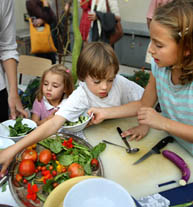Fruits (and vegetables) of their labour
Fruits (and vegetables) of their labour McGill University
User Tools (skip):
Fruits (and vegetables) of their labour

LEFT TO RIGHT: Sasha Belland, Justin Belland, Sarah Jordan James, enjoy the salad days of the rooftop garden.
Owen Egan
With all the green initiatives, tools and designs available to us, sustainable living is becoming a lot more accessible. The Rooftop Garden Project, a community initiative managed by Santropol Roulant and ALTERNATIVES, a non-profit, non-governmental organization, is a wonderful example of this. I volunteered recently at McGill's Edible Garden, our contribution to the Rooftop Garden Project, located beside Burnside Hall.
The Rooftop Garden Project uses a bucket gardening method that conserves water while also reducing the load that the container imposes on the surface on which it sits. Having little gardening experience, volunteering has been a hands-on way to learn about best practices and efficient urban agriculture. Volunteering between classes, interacting with nature and improving campus aesthetics has been energizing and has given me a sense of belonging.
Urban agriculture provides many community benefits. Growing food in urban centres reduces "food miles" (or the distance food has traveled before reaching a plate), thereby reducing greenhouse gas emissions. Additionally, gardens help in reducing the heat island effect common to cities. Although not all buildings are able to handle "green roofs," there are many techniques and ideas out there that can work with nearly every building—a notion that informs the (literally) groundbreaking work of Dr Vikram Bhatt, a professor in the School of Architecture and renowned proponent of urban gardens.
Our cities are filled with rooftops that can help curb global warming and strengthen communities while also providing fresh food and empowering those involved. McGill's Edible Garden is one such example of thinking globally and acting locally.
—Ghislaine Johnson
Bioresource Engineering Senior

